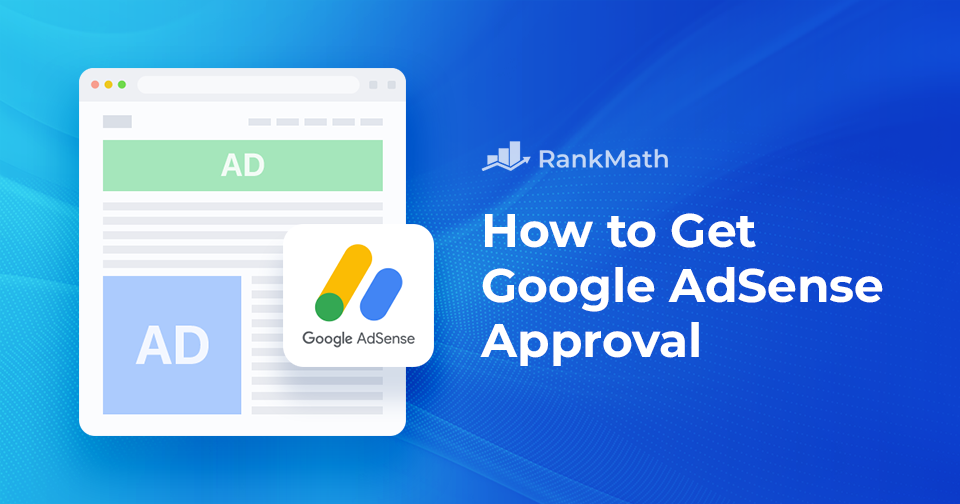Are you ready to turn your passion for blogging or website creation into a lucrative venture?
Imagine your carefully crafted content engaging your audience and generating a steady income stream. Well, Google AdSense can make that dream a reality!
Google AdSense is a revenue-generating powerhouse where strategy, creativity, and diligence come together to open the doors to a world of advertising possibilities.
In this guide, we’ll walk you through the intricate steps required to apply for AdSense and stand out in the eyes of Google as a trustworthy and valuable publisher.

Let’s get ready to uncover the secrets to success in online advertising.
It’s time to turn your passion into profit!💰
Table Of Contents
1 Getting Your Website AdSense Ready
Before we begin with the AdSense approval, let’s discuss the necessary steps that you need to consider for the AdSense approval.
1.1 Build a Well-Structured Website
Creating a well-structured website is the first step to obtaining Google AdSense approval.
A well-structured website improves your chances of approval and enhances the user experience. Have a clear, well-organized menu at the top or side of your site with labels like Home, About Us, Blog, and other relevant categories.

Keep your website’s design clean and uncluttered. Ensure you use consistent color schemes, readable fonts, and a layout that is visually pleasing and easy to navigate.
1.2 Create Quality Content
Your content should be well-written, informative, and engaging. It should provide real value to your visitors.
Your content should provide answers to questions your visitors might have. For instance, if your website is about cooking, your articles can be regarding cooking tips, recipes, kitchen advice, etc.
Google AdSense wants to show ads on websites that provide value to users. When you create valuable content, you attract more visitors and make your website more appealing to advertisers.
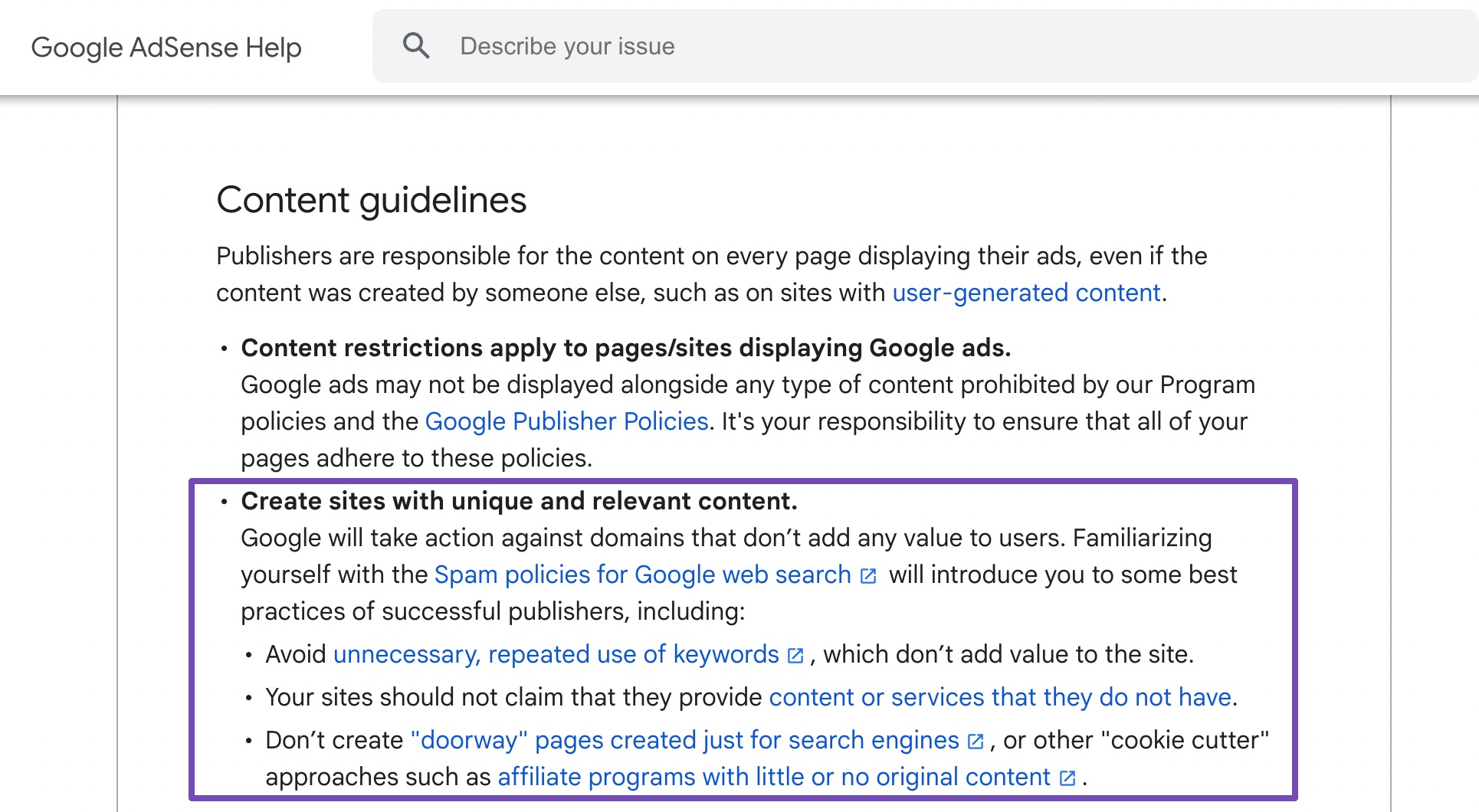
1.3 Website Policies
You need to create a few pages before applying for Google AdSense approval. Ensure your website has essential pages like:
- About Us: Tell visitors who you are and what your site is about.
- Contact Us: Provide a way for visitors to reach you.
- Privacy Policy: Explain how you handle visitors’ data.
- Terms of Service: Set the rules for using your site.
Ensure that your content adheres to Google AdSense content policies.
1.4 Improve User Experience
Improving user experience on your website is another important factor you need to consider before applying for AdSense approval.
Improve the performance of your website to make it load faster. This includes optimizing images, using efficient coding practices, and leveraging caching.
Your site should adapt and look good on various screen sizes, from large desktop monitors to small phone screens.
Regularly check and fix any broken links or missing pages on your website to provide a seamless experience.
Your site must not perform certain activities, such as redirecting to unwanted websites, initiating downloads, including malware, or containing pop-ups that interfere with visitors’ ability to navigate the site.
1.5 Organic Traffic
Organic traffic refers to the visitors who visit your website naturally, without you having to pay for ads or employ other artificial methods to attract them.
While paid traffic or click exchange programs may seem tempting to boost your numbers quickly, focusing on organic traffic is a more sustainable and reliable approach when seeking AdSense approval.
You can refer to our SEO Content Guide to boost your organic traffic and create SEO content to boost your online presence.
1.6 Build a Following
Google AdSense values websites with an active, engaged following because it indicates your site attracts and retains traffic.
You can utilize social media platforms to spread the word, interact with your audience, and broaden your reach. An email newsletter keeps your visitors informed and coming back for more.
Respond to comments on your site to create a sense of community. Also, guest posting on other websites allows you to introduce your expertise to a new audience.
As you build a loyal audience, your website becomes more attractive to visitors and potential advertisers, ultimately increasing your chances of Google AdSense approval.
1.7 Copyrighted Content
Copyrighted content includes text, images, videos, music, and any creative work that belongs to someone else. These works are protected by copyright laws, meaning you cannot use them without proper authorization.
Google AdSense strictly prohibits the use of any copyrighted content without permission. You must have the legal rights to display any content on your website for it to be eligible for monetization.
To comply with AdSense policies, create and share original content. Write your articles, take photos, or use content with appropriate licenses that allow you to use it legally.
Using copyrighted content without permission can result in AdSense account suspension or other legal actions. It’s essential to respect copyright laws to maintain good standing with AdSense and avoid potential legal troubles.
1.8 GDPR Compliance and Consent Messages in Google AdSense
GDPR, or the General Data Protection Regulation, is a comprehensive data privacy law enacted by the European Union (EU) to protect individuals’ personal data and privacy within the EU and the European Economic Area (EEA).
Regarding Google AdSense, GDPR compliance is important as it involves processing personal data, such as cookies and user identifiers, for personalized advertising.
Google AdSense requires publishers to obtain user consent for cookies and similar technologies that track user behavior for targeted advertising purposes.
Audiences are usually provided with options to accept or decline cookies, with the ability to customize their preferences.
1.9 Google Analytics and Webmaster Tools
Both Google Analytics and Google Search Console provide valuable data for improving your website’s performance, user experience, and content strategy – factors that enhance your chances of Google AdSense approval.
Google Analytics offers insights into user behavior and site performance, providing valuable data on audience demographics, traffic sources, conversion rates, etc.
Google Search Console ensures proper indexing, reveals crawl errors, provides search query data, and enables sitemap submission.
By harnessing the data from these tools, you can optimize your website, attract organic traffic, and create a more engaging platform, aligning it with AdSense requirements. Ensure that you follow the Google Webmaster Guidelines for AdSense approval.
You can connect your Google account with Rank Math and collect all the useful insights within your WordPress dashboard.
2 How to Set Up Google AdSense Account
Now, let’s start creating a Google AdSense account.
To begin with, visit the Google AdSense website and click Get started.
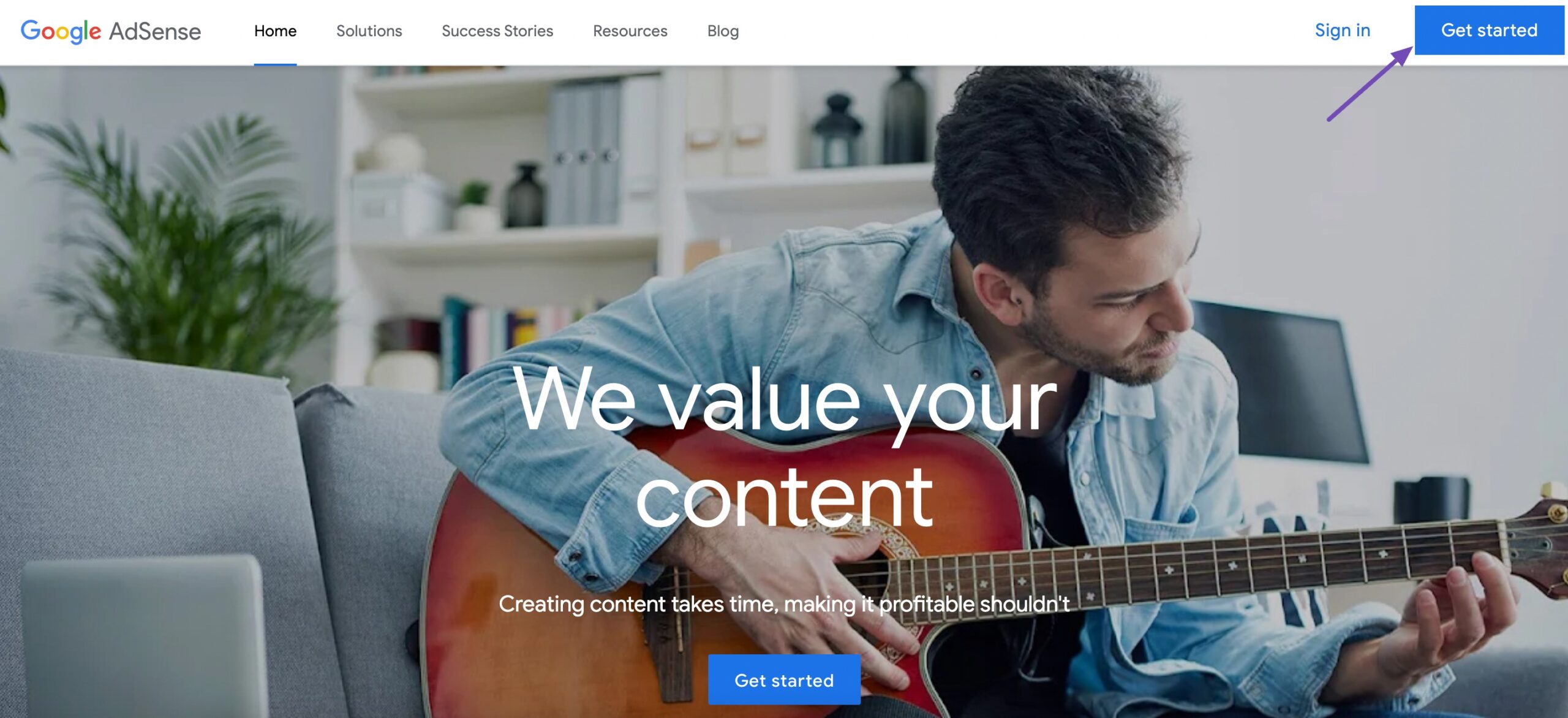
Next, sign in to your Google account. It’s important to note that you can have only one Google AdSense account, but multiple sites can be approved for the same account.
Once you’ve logged in to your Google account, enter the website URL on which you want to show ads. Leave this area empty if you want to add your site later and choose I don’t yet have a site yet.
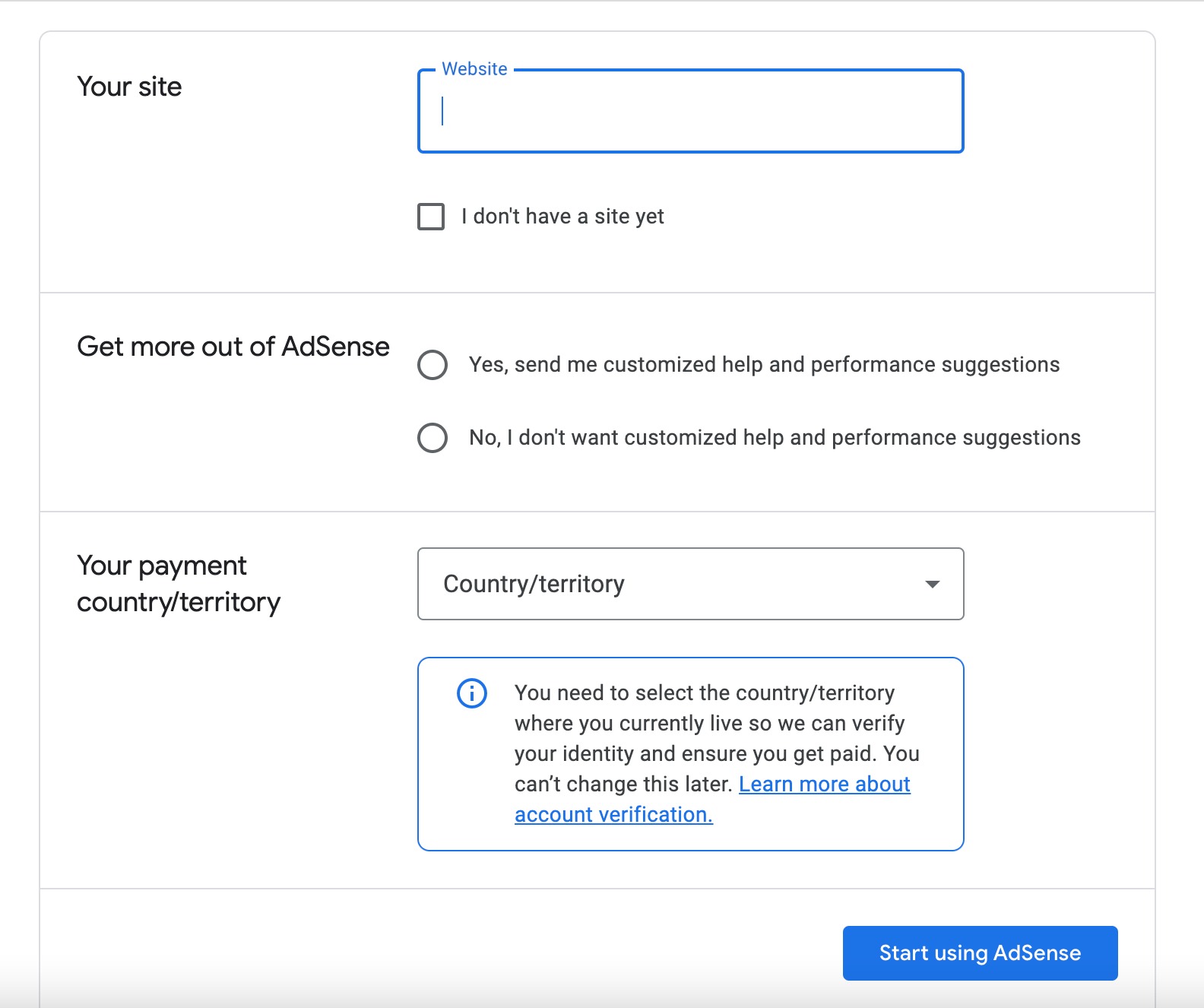
Decide if you’d like AdSense to provide personalized assistance and performance tips. We recommend selecting Yes to maximize your AdSense experience. You can adjust your preferences later.
Pick the country or territory where you reside and receive a Personal Identification Number (PIN) by mail. This choice ensures you’ll receive your payments correctly in the future. Please note that you won’t be able to change your country or territory selection in AdSense later.
Carefully read through the AdSense Terms and Conditions. Once you’re comfortable with the terms, click Start using AdSense.
You are now successfully logged into your new AdSense account, ready to use its features and capabilities.
3 How to Activate Google AdSense Account
Once you’ve created your AdSense account, it’s time to activate it to start earning money.
After your AdSense account creation, you’ll be redirected to the Google AdSense Dashboard page, as shown below.
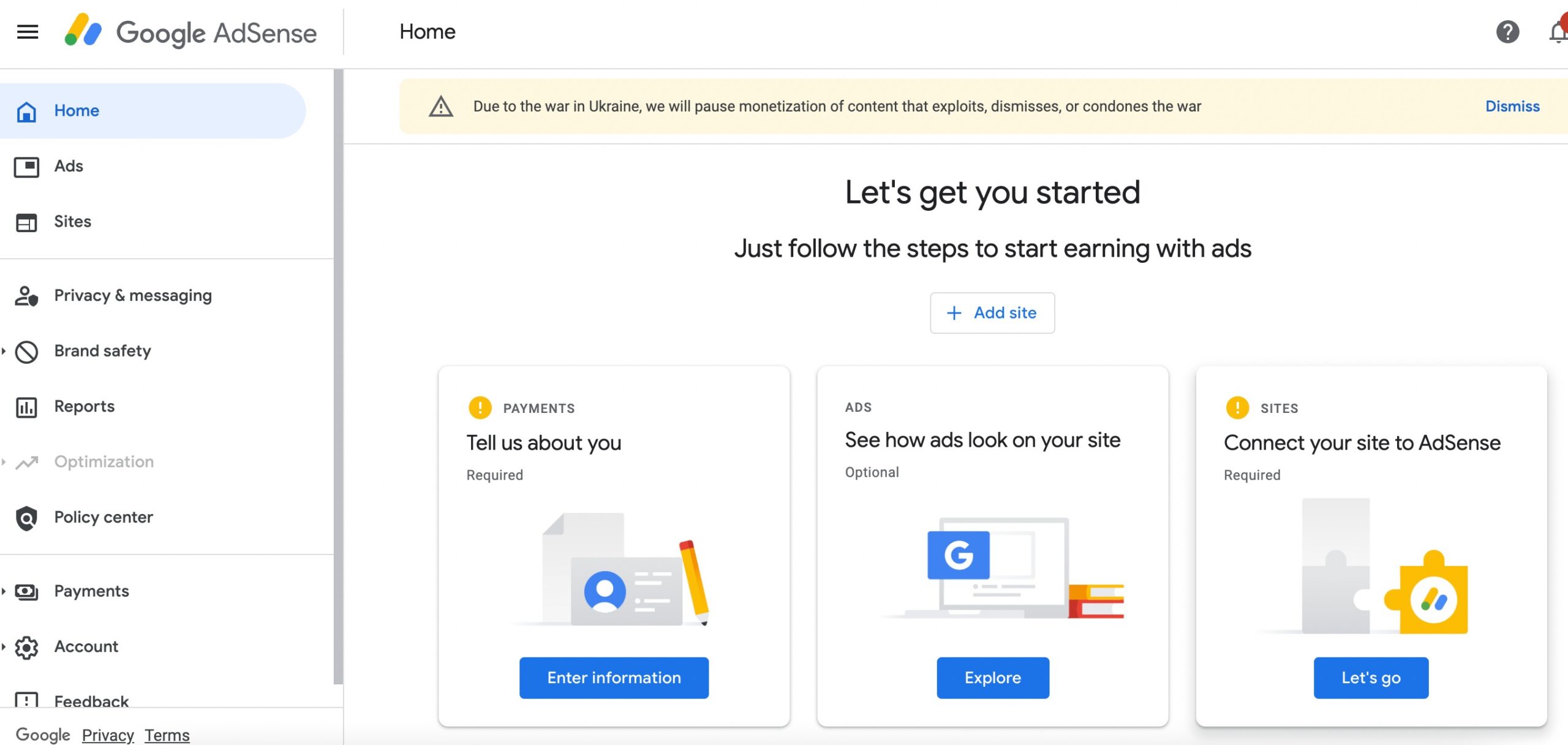
3.1 Enter Your Payments Information
To complete the AdSense activation process, you must accurately complete your payment details. This step is crucial to ensure you receive your payments without any issues.
Click on Enter information to add your payment details.
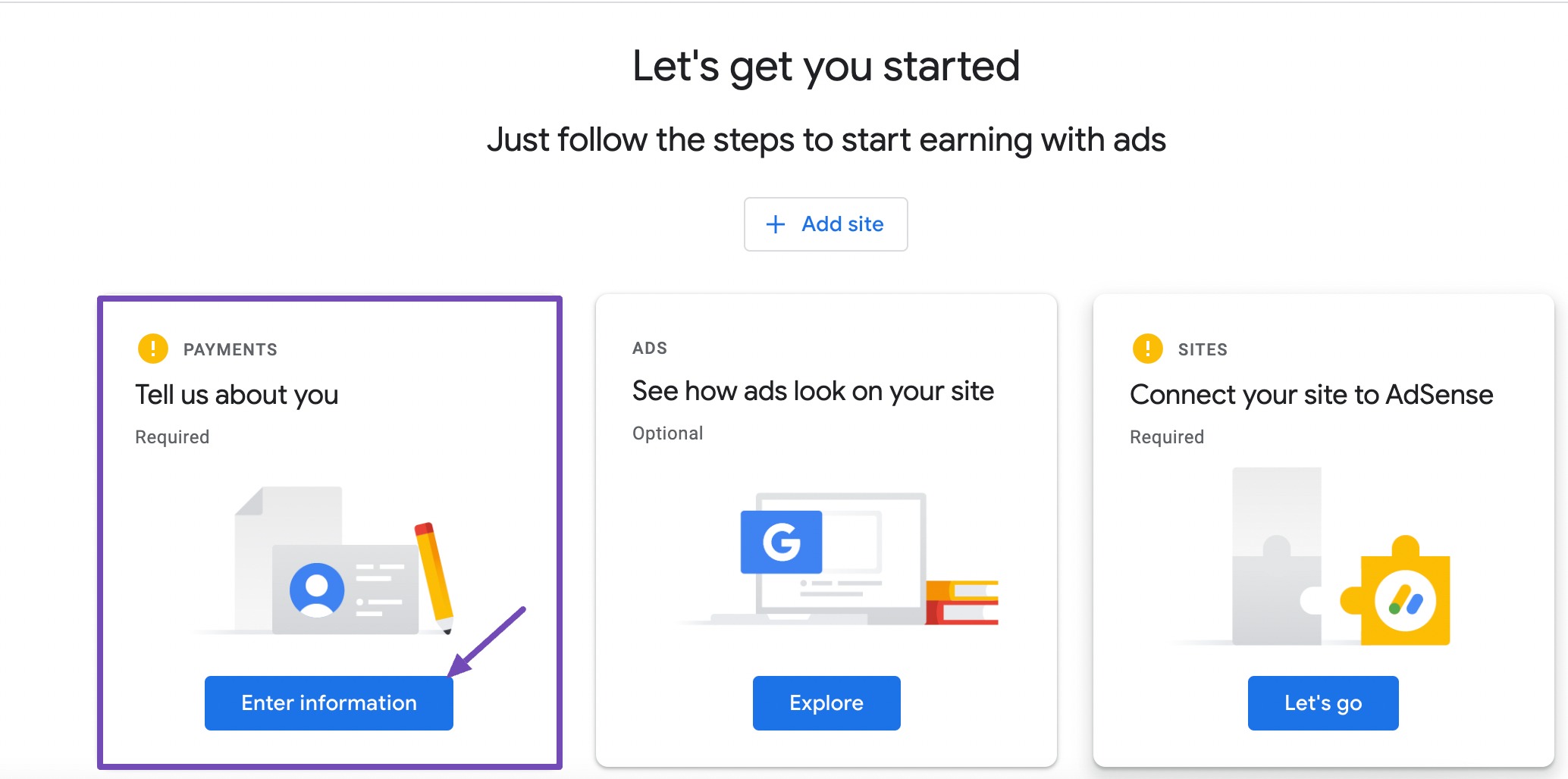
Select the Account type: Individual or Business. You can do it only once.
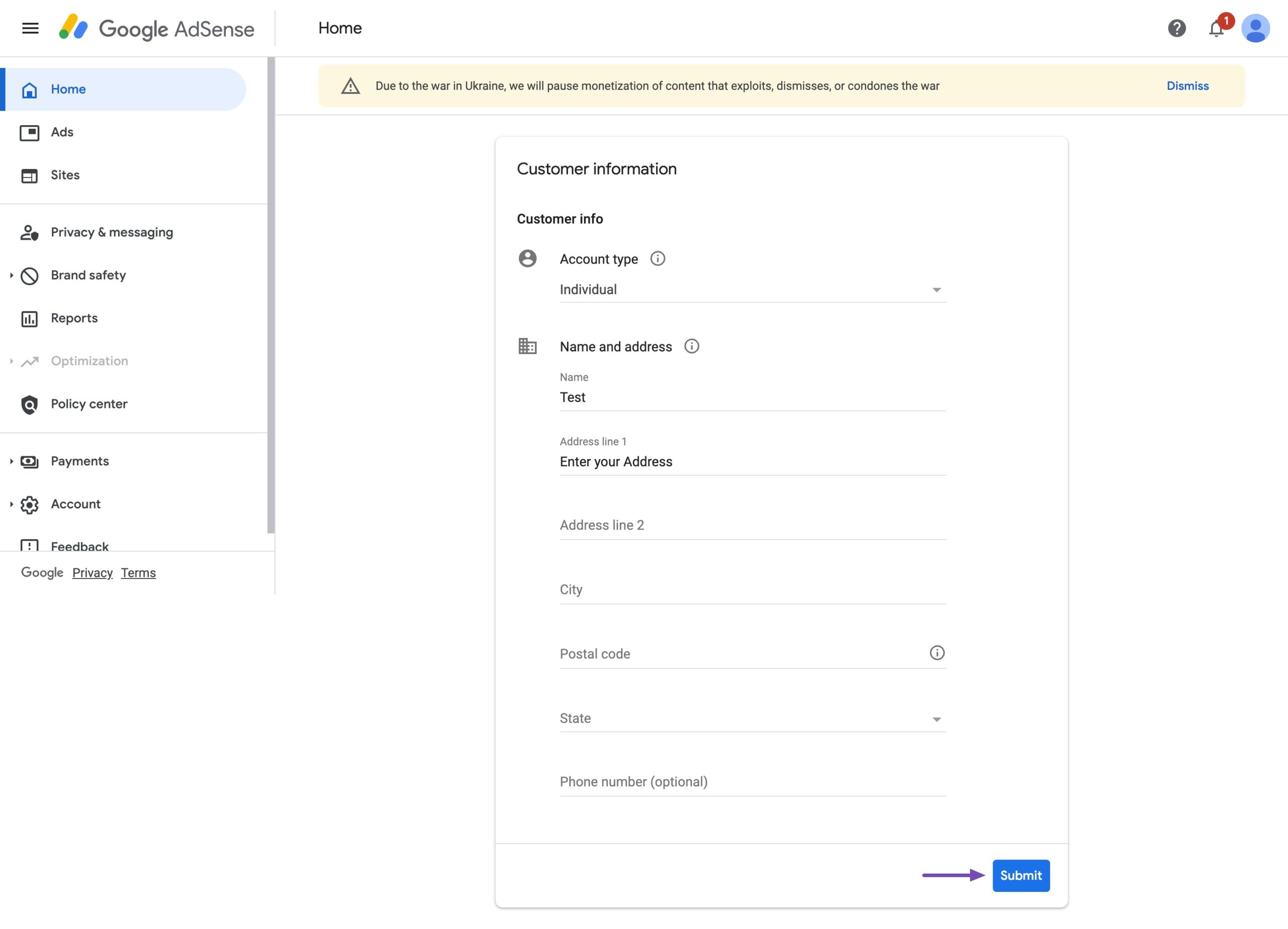
Enter your name and address in the corresponding fields. Enter your full name for individual accounts exactly as it appears on your banking information.
For business accounts, provide your company’s name in the Business name field and the name of the point of contact for your company in the Name field.
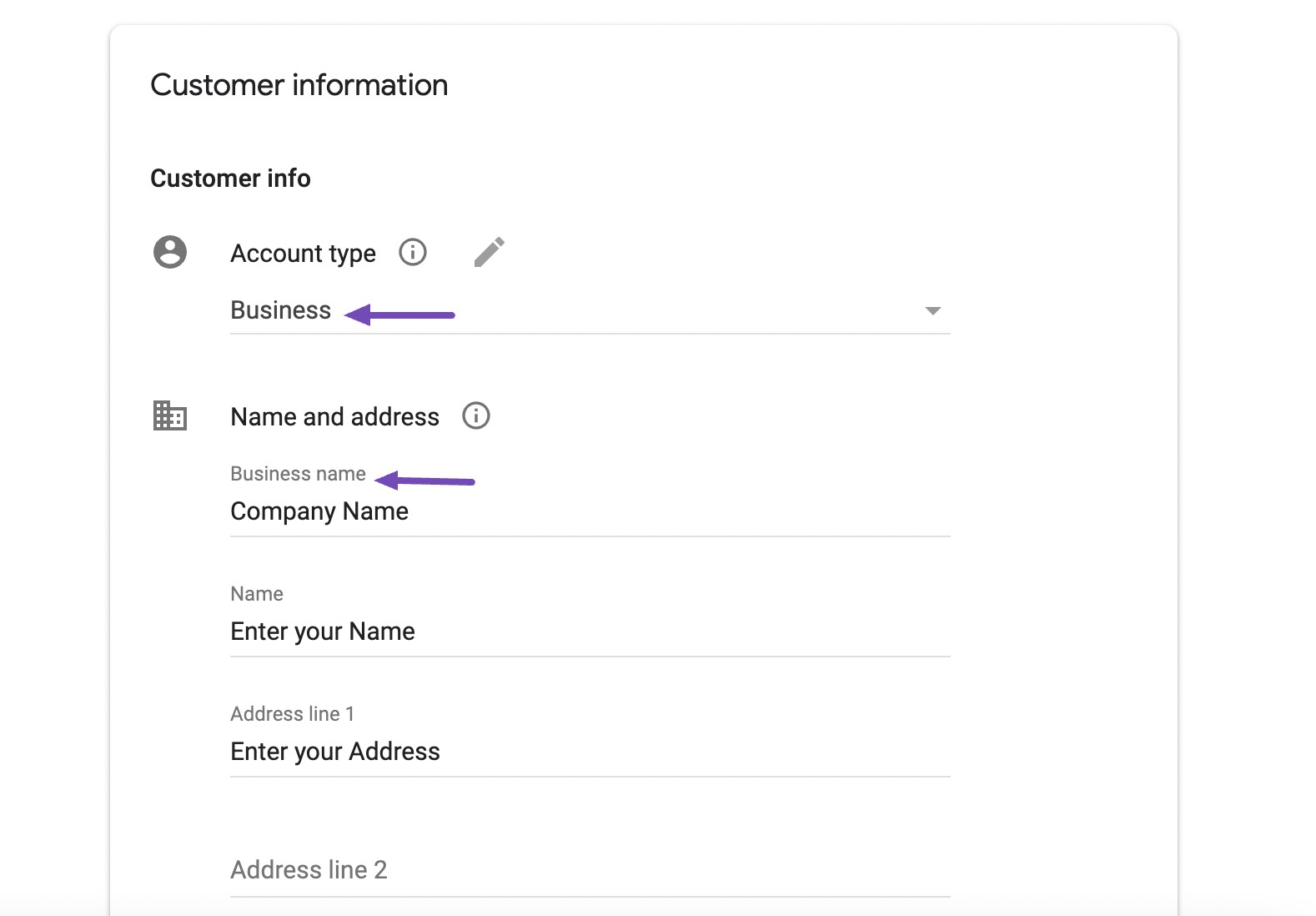
Depending on your location, you might also be required to add a valid phone number during the AdSense account activation.
Google utilizes phone number verification to verify the accuracy and currency of your information. Input your phone number using the international format: +(Country code)(Area code)(Phone number).
Note: Ensure your phone number’s country code matches your selected country or territory during your AdSense signup. For instance, if you chose the United Kingdom during registration, your phone number should begin with +44.
Next, select your preferred method to receive the verification code via text message or a voice call.
Click on the Get verification code button. Once you receive the 6-digit verification code, enter it into the designated field and click Submit.
3.2 See How Ads Look on Your Site
During the AdSense activation process, you can preview how ads appear on your site before making them live.
This can be helpful if you’re interested in seeing how Google ads will look and where they will be positioned on your site.
To do so, click Explore in the ADS section, as shown below.
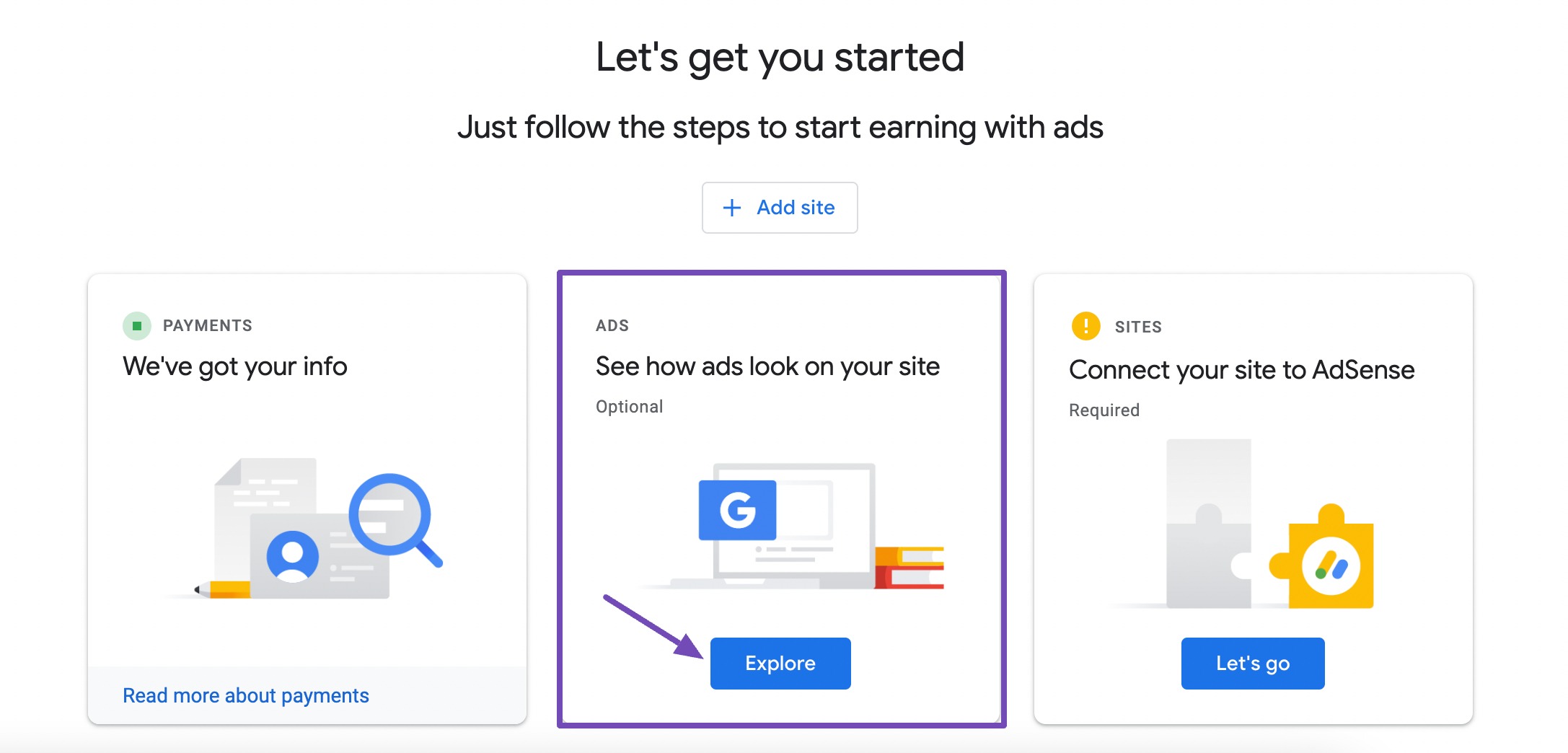
In the preview, you also have the choice to enable Auto ads, which will automatically display ads on your site once your account is activated.
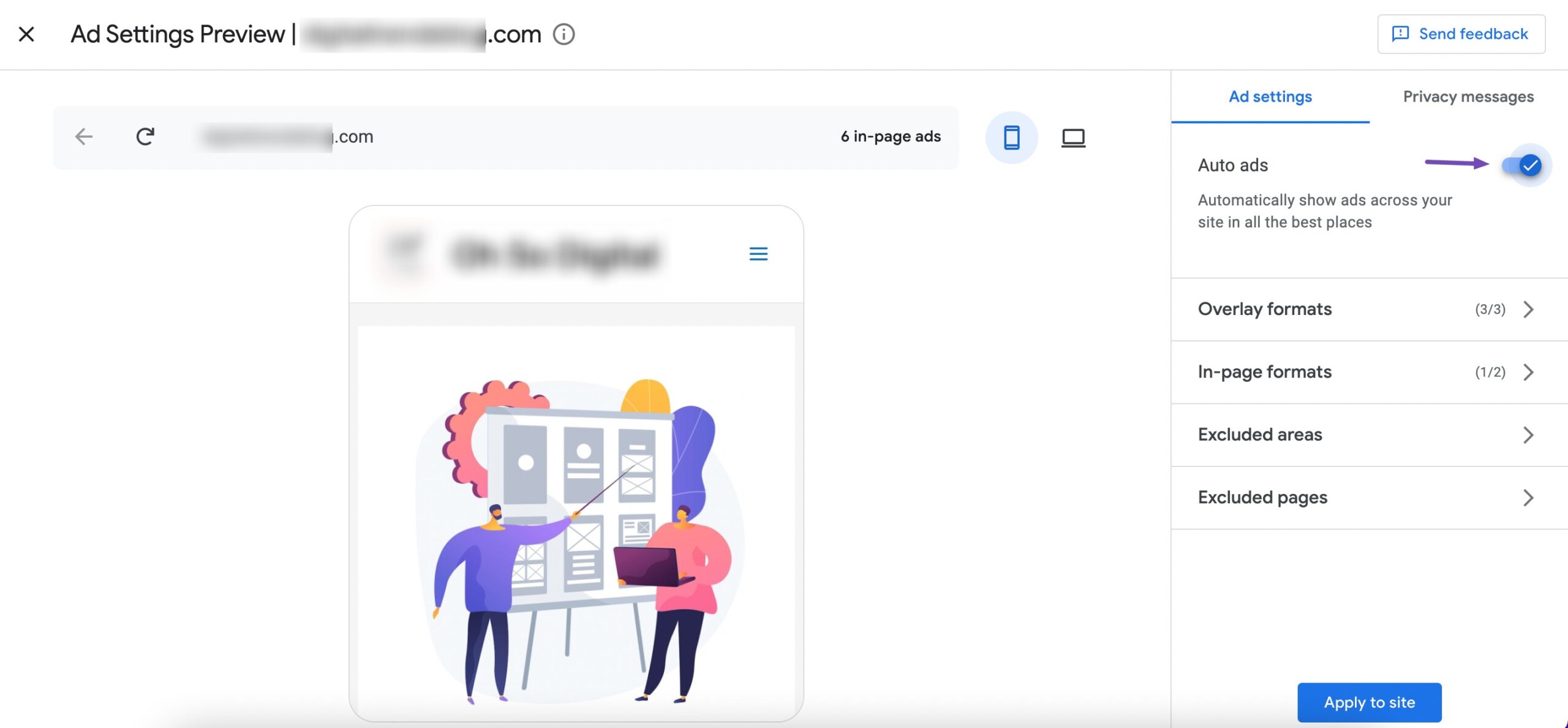
Once done, click on the Apply to site button.
3.3 Connect Your Site to AdSense
To complete the AdSense activation process, connect your site to AdSense. You won’t be able to show ads until your site’s been approved.
Click Let’s go in the Sites section to connect your site to AdSense.
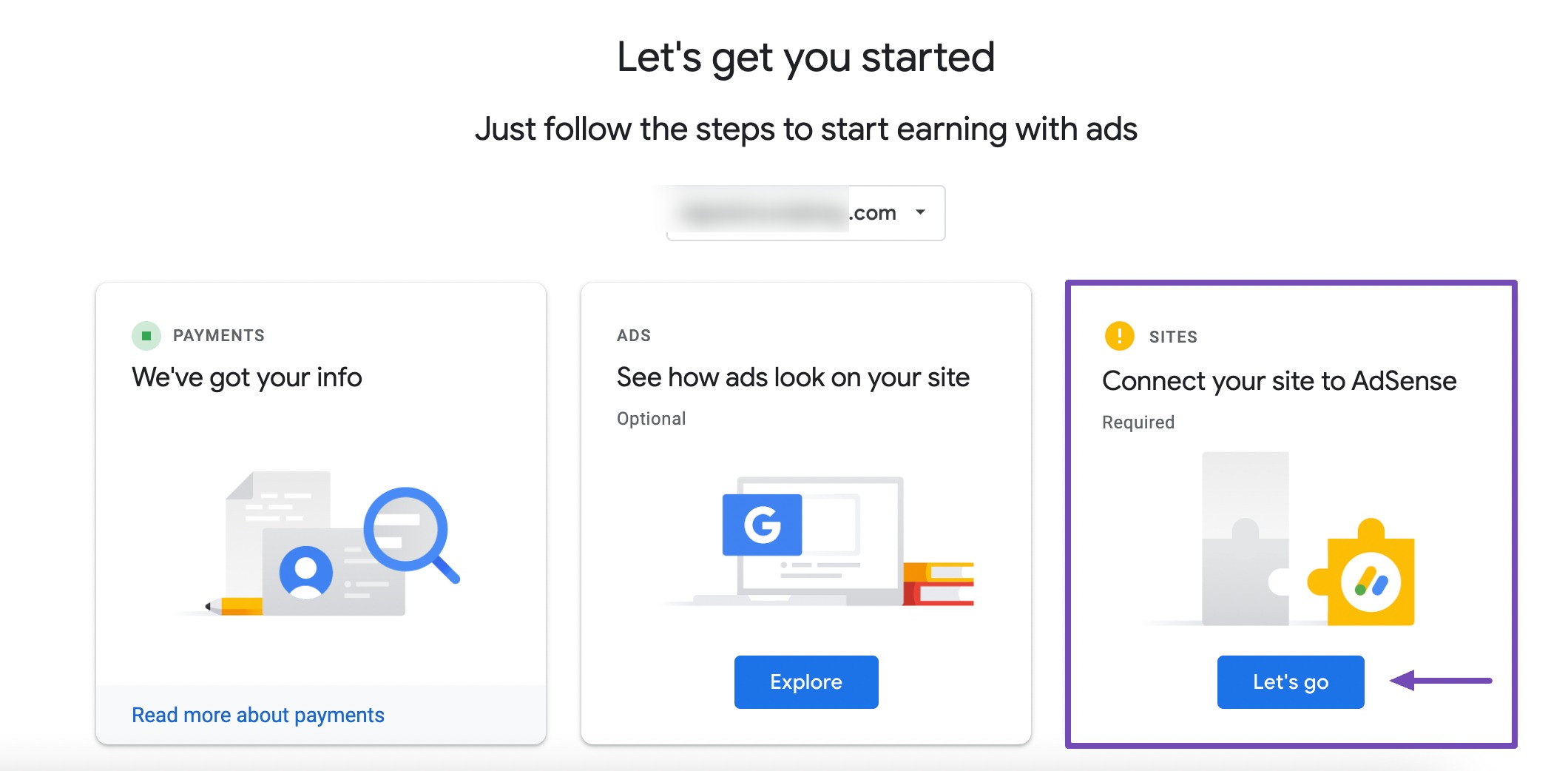
Copy the AdSense code and paste the code into the HTML of your page between the <head> </head> Tags.
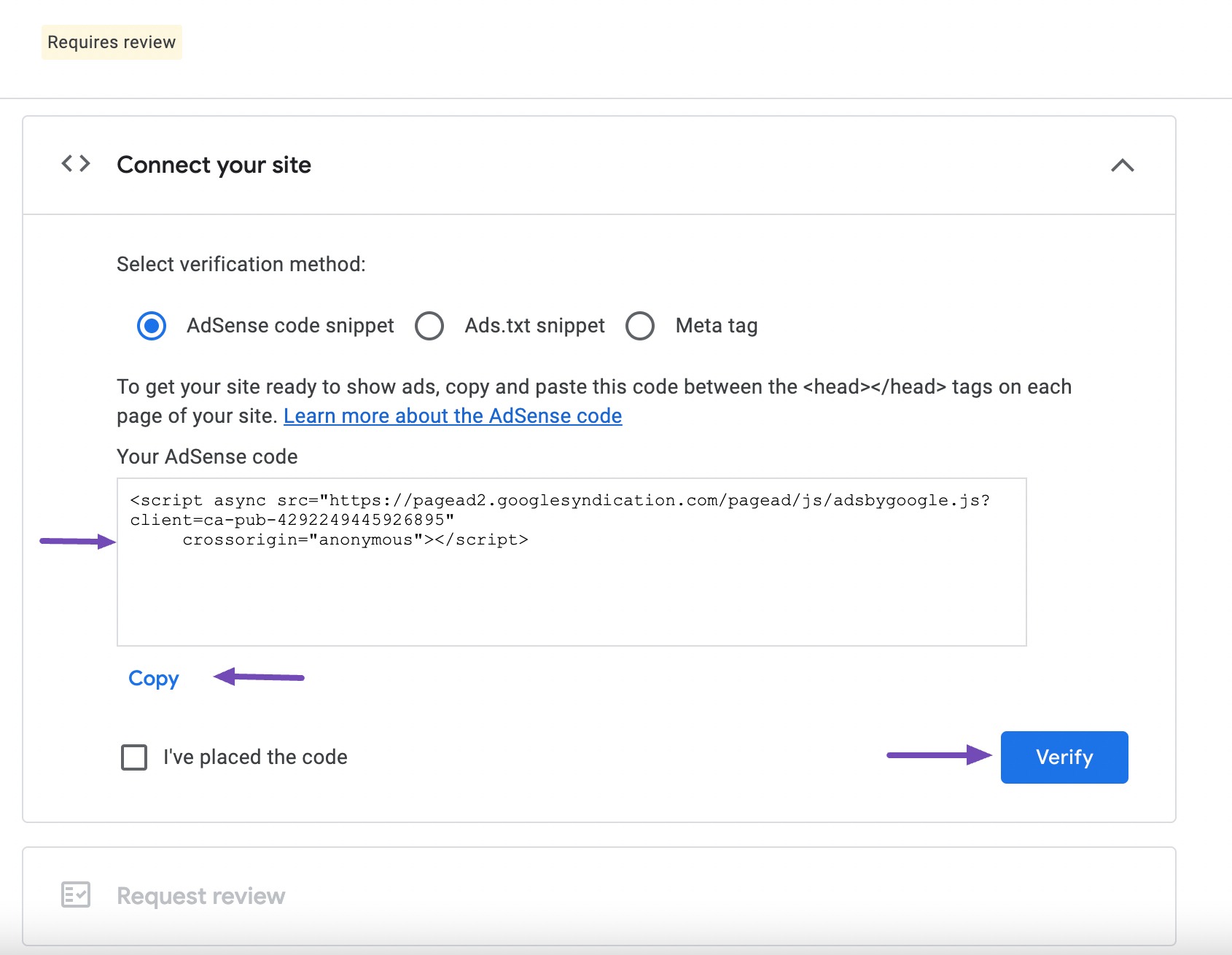
Once done, Click Request review.
If your application is rejected, carefully review the feedback provided by Google. Make necessary changes and improvements based on the feedback. Reapply once you believe your website meets the requirements.
4 Conclusion
In wrapping up this guide on Google AdSense approval, it’s clear that success lies in the details.
Crafting a well-structured website, offering valuable content, and ensuring an excellent user experience are non-negotiable. Like planting and tending to a thriving garden, organic traffic results from your hard work and patience.
Building an engaged following and respecting copyright laws are equally crucial. With Google Analytics and Search Console as your trusty tools, you’re well on your way to AdSense approval.
So, remember, it’s not just about getting that coveted approval; it’s about creating a sustainable and rewarding online presence built on quality, user satisfaction, and ethical content.
Happy blogging and monetizing!
If you like this guide, let us know by Tweeting @rankmathseo.
